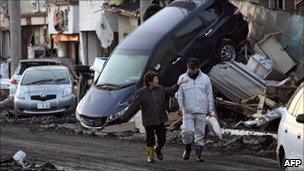Japan rebuild could take five years, World Bank says
- Published

Japan may need up to five years to rebuild from the disastrous earthquake and tsunami that has caused up to $235bn (£145bn) of damage, the World Bank said in a report.
It also estimates that 0.5 percentage points will be shaved from the country's economic growth this year.
However, it expects growth to pick up again in the second half of the year.
The 11 March earthquake and tsunami, disrupted production networks in the automotive and electronic industries.
"Damage to housing and infrastructure has been unprecedented," the World Bank said.
"Growth should pick up through subsequent quarters as reconstruction efforts, which could last five years, accelerate," it said.
The bank estimates the damage to be between $123bn and $235bn.
This is the equivalent of between 2.5% and 4% of the country's economic output in 2010.
The World Bank stressed that it was too early to accurately assess the cost of the damage, but said it was likely to be greater than the 1995 Kobe earthquake.
That caused $100bn of damage, then the equivalent of 2% of GDP.
The bank added that private insurance firms would only be liable for a small proportion of the cost of rebuilding, leaving households and the government to pay for the bulk of it.
Knock-on effects
The World Bank also predicted in a separate report that East Asia would be affected.
"In the immediate future the biggest impact will be in terms of trade and finance," said Vikram Nehru, World Bank chief economist for the East Asia and Pacific region.
Japan's north-east region, where the earthquake and tsunami hit, is home to ports, steel mills and manufacturers of auto and electronic components.
"Disruption to production networks, especially in automotive and electronics industries, could continue to pose problems," the bank said.
The other worrying factor for the region is that about one quarter of East Asia's long-term debt is denominated in yen.
For China it is only about 8%, but for Thailand it is about 60%.
A 1% appreciation in the Japanese yen translates into about a $250m increase in annual debt servicing on the yen-denominated assets held by the nations, the report points out.
The region is expected to see less robust growth in 2011 as it fights inflation.